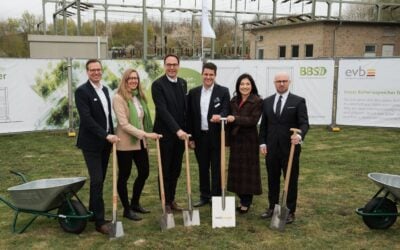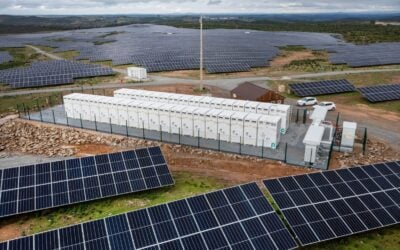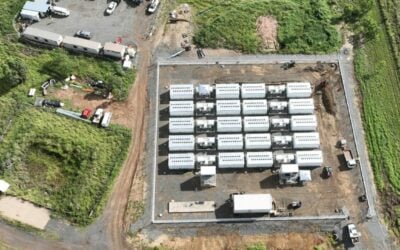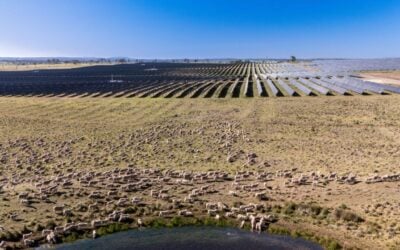
Another roundup from the world of energy storage, with news from SMA, Canadian Solar’s e-Storage and Trina Storage.
Canadian Solar’s e-Storage in BESS supply deal for 100MW/576MWh Arizona project
Update 26 March 2025: A Strata Clean Energy spokesperson responded to Energy-Storage.news’ enquiry on the capacity of the BESS project as reported below and explained that at 100MW/576MWh, the White Tank asset is being “oversized to account for potential degradation of lithium-ion batteries over the lifetime of the project.” The spokesperson added that “White Tank is still a 4-hour duration system as stated in the original project announcement.”
Enjoy 12 months of exclusive analysis
- Regular insight and analysis of the industry’s biggest developments
- In-depth interviews with the industry’s leading figures
- Annual digital subscription to the PV Tech Power journal
- Discounts on Solar Media’s portfolio of events, in-person and virtual
Or continue reading this article for free
Canadian Solar’s battery energy storage system (BESS) integration arm will provide technology and servicing to a 100MW/576MWh standalone project in Arizona, US.
The vertically integrated solar PV manufacturer said last week (20 March) that its e-Storage subsidiary has been contracted to supply equipment to US developer Strata Clean Energy for its White Tank BESS project.
Strata Clean Energy signed a tolling agreement last year for the BESS with utility Arizona Public Service (APS) last year after participating in an all-source Request for Proposals (RfP).
Strata also won a contract through the same 2023 RfP for another project, the 150MW/600MWh Justice Energy Storage BESS.
At the time of that deal’s announcement in November 2024, White Tank’s storage capacity was given as 400MWh. Energy-Storage.news has asked Strata Clean Energy for details on the upsizing of announced capacity.
e-Storage is a division of Canadian Solar’s manufacturing division, CSI Solar and will supply around 120 units of its proprietary BESS solution, SolBank 3.0. According to Canadian Solar, construction will begin in October 2026. A previous announcement about the APS tolling agreement said the asset is due to go into commercial operation by April 2027.
SMA launches central inverter with silicon carbide semiconductor technology
SMA has launched its newest central inverter for energy storage applications, Sunny Central Storage UP-S, into the US market.
The Germany-headquartered solar PV inverter and BESS power conversion system (PCS) manufacturer announced the US launch last week (20 March) after first debuting the solution in Australia.
Aimed at large-scale projects, SMA claims Sunny Central Storage UP-S offers higher efficiency through its SiC MOSFET (silicon carbide metal-oxide-semiconductor field-effect transistor) technology. SMA said this enables over 99.2% efficiency in power conversion.
It also comes with grid-forming capabilities, which allow inverter-based resources to provide grid stability services such as inertia and short-circuit ratios. SMA’s Aaron Philipp Gerdemann wrote a deep-dive feature article on grid-forming for our quarterly journal PV Tech Power (Vol.39) last year.
The central inverter comes with a proprietary air-cooling thermal management system, and is designed to handle up to 4,600kVa with no derating at temperatures of up to 35°C.
Trina Storage BESS designed for Australian climate and regulations
Trina Storage launched Elementa 2 Pro 5MWh, the new version of its integrated BESS solution, at Energy Storage Summit Australia 2025.
The energy storage arm of another vertically integrated solar PV manufacturer, Trinasolar, unveiled the product at the conference hosted last week in Sydney, New South Wales, by our publisher Solar Media.
As the name suggests, the unit has up to 5MWh storage capacity. It is equipped with Trina Storage’s in-house developed 314Ah lithium iron phosphate (LFP) battery cells, which the company claims can perform up to 15,000 cycles.
This follows the early 2024 launch of its predecessor Elementa 2, which was designed for a lifetime of up to 12,000 cycles.
Elementa 2 Pro 5MWh also includes new features that make it suitable for market conditions in Australia’s rapidly growing BESS sector.
The solution is certified for C5 corrosion protection, and the battery modules are IP67-rated for dust and water protection.
A so-called ‘intelligent hybrid air-liquid cooling system’ maintains a sub-2.5°C internal temperature difference and reduces auxiliary power consumption. The company claimed it can operate in ambient temperatures of up to 55°C.
As attendees at the summit heard, BESS fire safety and potential noise pollution are growing concerns for Australian communities.
Elementa 2 Pro 5MWh has advanced fire mitigation and suppression systems and a sandwich cabin structure (comprising two outer layers with insulation between them), and can operate at 70dB, which Trina Storage said enables projects to comply with stringent regulations on both fronts.






